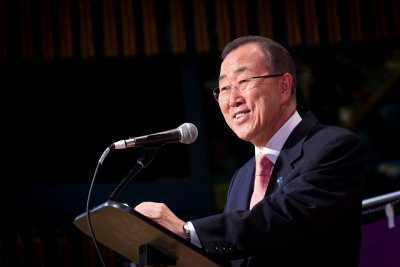Module 1: About the United Nations

8th United Nations Secretary General Ban Ki-Moon (2007-2015) at the podium
The United Nations (UN) is an intergovernmental organisations that works with states to agree on matter of global importance. The UN was created in 1945 following the most destructive global war that the world had seen. The climate was right to get states into a room and negotiating with one another about international issues such as people movement, poverty and peace and security. Fast forward nearly seventy years, and UN is a large bureaucracy with five major bodies, a staff of over forty thousand people, and an operating budget of approximately five and a half billion US dollars.
In this module, you will be given a basic overview of the history and structure of the UN. You will learn about its current role and mandate, and be introduced to some examples of what it is currently doing.
Content
Week 1: Background and History of the United Nations
Week 2: The United Nations System Today: Linking with International Relations Theory
Week 3: The United Nations and Reform
Assessment
Online quiz about the UN worth 20%
You will also be starting to tweet using the course hashtag #UOWMUN to communicate with other students in the course.
Resources
There are a whole range of books on the UN system. Below are some of the most useful ones.
For UOW students, items with an *asterisk are on short loan at the UOW library and items
with a **double asterisk are available as ebooks from the UOW library. For open learning students
you might find some of these books at a local public library.
- **Alger, Chadwick F; Gene M Lyons and John, E Trent, The United Nations System: the
Policies of Member States (United Nations University Press, 1995)
- **Finizio, Giovanni and Ernesto Gallo (eds), Democracy at the United Nations : UN Reform
in the Age of Globalisation (Peter Lang AG, 2103)
- *Gorman, Robert F, Great Debates at the United Nations: an Encyclopedia of Fifty Key
Issues (Westport, CT : Greenwood Press, 2001)
- **Hanhimäki, Jussi M. The United Nations: a Very Short Introduction (Oxford University Press, 2008)
- *Mazower, Mark, Governing the World: The History of an Idea, 1815 to the Present (Penguin 2013)
- *Meisler, Stanley, United Nations: The First Fifty Years (New York: Atlantic Monthly Press, 1995)
- *Muldoon, James P. (ed.) Multilateral Diplomacy and the United Nations Today (Cambridge, Mass.: Westview Press, 2005)
- Schechter, Michael G, United Nations Global Conferences (New York, NY: Routledge, 2005)
- **Weiss, Thomas G., What’s Wrong with the United Nations and How to Fix It (Wiley, 2013)
- ♙*Weiss Thomas G. (ed.), The United Nations and Changing World Politics (Boulder, Colo.: Westview, 2007)
- *Weiss Thomas G. and Sam Daws (eds), The Oxford Handbook on the United Nations (Oxford: Oxford University Press, 2007)
- Weiss, Thomas George, David P. Forsythe and Roger A. Coate, The United Nations and Changing World Politics (Boulder, Co: Westview Press, 2001)
- Ziring, Lawrence, Robert E. Riggs and Jack C. Plano, The United Nations: International Organization and World Politics (Fort Worth: Harcourt College Publishers, 2000)
United Nations Associations in different countries also produce a range of books and other
publications that are likely to be of use to students
Module 1: About the United Nations
The United Nations (UN) is an intergovernmental organisations that works with states to agree on matter of global importance. The UN was created in 1945 following the most destructive global war that the world had seen. The climate was right to get states into a room and negotiating with one another about international issues such as people movement, poverty and peace and security. Fast forward nearly seventy years, and UN is a large bureaucracy with five major bodies, a staff of over forty thousand people, and an operating budget of approximately five and a half billion US dollars.
In this module, you will be given a basic overview of the history and structure of the UN. You will learn about its current role and mandate, and be introduced to some examples of what it is currently doing.
Content
Week 1: Background and History of the United Nations
Week 2: The United Nations System Today: Linking with International Relations Theory
Week 3: The United Nations and Reform
Assessment
Online quiz about the UN worth 20%
You will also be starting to tweet using the course hashtag #UOWMUN to communicate with other students in the course.
Resources
There are a whole range of books on the UN system. Below are some of the most useful ones.
For UOW students, items with an *asterisk are on short loan at the UOW library and items
with a **double asterisk are available as ebooks from the UOW library. For open learning students
you might find some of these books at a local public library.
Policies of Member States (United Nations University Press, 1995)
in the Age of Globalisation (Peter Lang AG, 2103)
Issues (Westport, CT : Greenwood Press, 2001)
United Nations Associations in different countries also produce a range of books and other
publications that are likely to be of use to students
Content is available under the
Creative Commons Attribution Share Alike License.
Privacy Policy | Authors